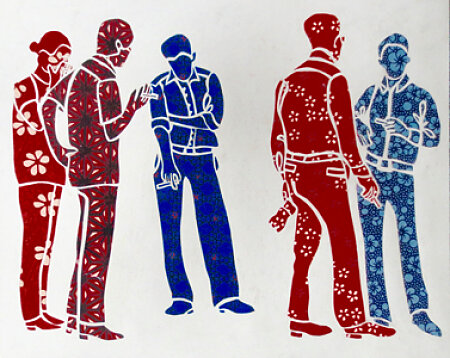
Moscow Cockroaches
The room is small, nondescript, with bare walls painted a peeling green. Stains dominate the ceiling. Three sagging box springs are topped with shabby mattresses; a wobbly wooden table with three chairs completes the setup. The window looks out on generic city outskirts submerged in darkness.
A robust army of cockroaches shares the room with us. They hurry up and down the walls like busy strangers. Shocked, we murder many, until we remember that their species has no direct interest in ours.
It’s almost 1 a.m. We’ve brought a bottle of cheap red wine. We are starving, but not much can be done about that. We take sips from the bottle. Soon, we crack up, making fun of everything, from ourselves to the communist state—intoxicated not from the wine we just opened but from the sheer improvisation of this night.
A knock at the door disrupts our laughter. Are we being kicked out?
“I heard you guys laughing.” The newcomer is a bearded guy slightly older than the three of us. “Mind if I join you? I’m staying here for the summer, you know. Not much to do back home.”
“For sure,” we say in one voice.
“We don’t have anything to drink from.” I hand him the bottle.
“Wait a minute.” Our new companion is out the door, then back with five glasses. “Here! And I can bring another bottle when we run out. We should invite Akwasi. He’s a great guy, you’re going to love him. He’s from Africa.”
“Sure, why not.”
“By the way, my name is Nikolaj.”
Nikolaj runs off once more and returns with the African student, the first black person I’ve ever met.
“Hello,” Akwasi says in Russian, proffering his hand.
“Hello! Are you staying here for the summer?” We shake.
“Yes!” He laughs. “It’s safer than back at home.”
I like him right away.
True enough, life in the USSR is good for foreigners, even if I can’t imagine its being particularly exciting. Much cheaper than going to school in London or Paris. For us citizens, life is ideologically restricted and logistically difficult. Everything is available to foreigners at special shops doing business in dollars, but, for Soviet citizens, even the possession of foreign currency is a crime—and the stores open to us sit empty.
Nikolaj brings extra chairs, and we settle around the tiny table. Dmitry pours the wine.
“So, guys, what do you think of UFOs?” Nikolaj winks.
I play along. “I wouldn’t be surprised.”
“That’s right.” Nikolaj lights up. “I’ve been doing some research this summer.”
“Let’s drink to UFOs.” Sergey raises his glass.
